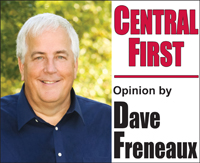Editorial/Op
250 Apartments? Do the Right Thing!
 Last week I promised to investigate how the 41 apartments in the new Shoe Creek development somehow became 250 apartments. The short version is that no one in Central’s government who approved the project, from Mayor Shelton to the Council Members to the Planning and Zoning staff, have been able to explain the math. So, Central is now faced with 250 apartments being built across the street from Walmart… but was it done right?
Last week I promised to investigate how the 41 apartments in the new Shoe Creek development somehow became 250 apartments. The short version is that no one in Central’s government who approved the project, from Mayor Shelton to the Council Members to the Planning and Zoning staff, have been able to explain the math. So, Central is now faced with 250 apartments being built across the street from Walmart… but was it done right?
Let me give you the highlights of the issue here. A more detailed analysis and all of the source documents I reference can be found on pages 4-6 of this week's Central Speaks newspaper.
How 41 Apartments Became 250
Central’s Master Plan, which is a pattern for growth (not a law), suggested that this specifically-defined type of development be allowed more density than the normal zoning. So Central wrote ordinances (which are laws) to give “density bonuses” to this type of project. According to the City Zoning Staff, Central’s ordinances (again, laws) for this type of development, including “density bonuses”, allow 41 apartments to be built in the Settlement on Shoe Creek.
Problem is, the developers wanted 250 apartments, not 41. So apparently our elected officials “creatively applied” the density suggestions of the Master Plan (not law) to justify violating an ordinance (law.)
If our laws allow 250 apartments, build them, but if our laws only allow 41, you can’t build 250 just because you want to. Do the right thing.
How a Rejected Traffic Study Was Revived
A major factor in the approval process is a study of the traffic impact on Sullivan Road, which required approval by East Baton Rouge Parish. When the EBR traffic engineers found out that the development would not connect to Morgan Place, and that the connection to Central Square was not a done deal, they invalidated the traffic impact study eight days before the council vote.
With the council vote looming, our city officials then went to great lengths to convince the EBR traffic engineers that the connection to Morgan Place should still be included in the study, even though the council had voted not to let it happen. They also told EBR that the connection to Central Square was a done deal, even though there was not a signed agreement to make it happen. With this “new information,” EBR approved the traffic study.
If there’s anything we can all agree on, it’s that we need to make sure our traffic is not made any worse than it already is. The traffic impact of this development on Sullivan Road and Central’s busiest intersections needs to be studied correctly, factoring in no connection to Morgan Place. If an accurate study shows the traffic impact of a project is acceptable, then build it, but don’t build anything if the study is questionable. Do the right thing.
Who Paid for the Second Entrance
The connection mentioned to Central Square was critical to the traffic study, and having two entrances was also a requirement placed on the developer by Central. The project had to have a second entrance.
Four days before the council meeting, Mayor Shelton made a deal on his own to have the owner of Central Square build a road connecting to the Shoe Creek project. In exchange, the City of Central’s taxpayers would assume financial responsibility for all future street and drainage maintenance for the Central Square development. The Mayor’s agreement was never authorized by the City Council, nor was the resulting change in the Central Square development approved by Central’s Planning Commission. This raises serious questions as to whether this was done according to the rules.
In all other projects I have seen in Central, the city requires the developer to pay to have the required entrance access into other properties. In this deal, the taxpayers are footing the bill to make it possible. That just does not seem right to me. If the Settlement on Shoe Creek needs a second entrance, and if the developer pays for it, approve the project, but don’t make a deal to have the taxpayers pick up the bill. Do the right thing.
Good development that follows our laws and is well-planned is smart growth. Bending the rules, making deals, and avoiding questions is not. Do the right thing… and THAT would be Good News for a Great City.


1 Comment